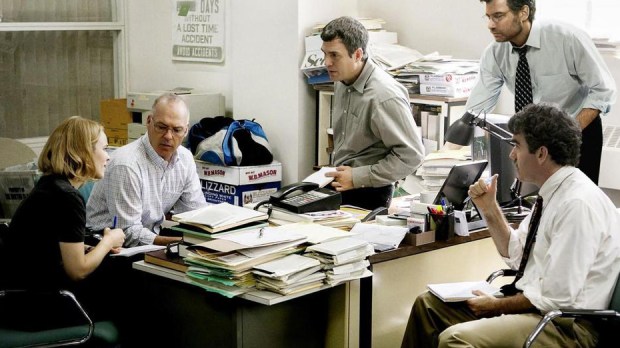Before discussing whether or not Spotlight is any good as a motion picture, let’s go ahead and answer the question that’s probably on the minds of many a Catholic. No, this movie is not the hatchet job on the Church and her teachings, which it so easily could have been. For the most part the screenplay for Spotlight steers away from any ad hominem attacks of the Church’s theology and narrows it focus instead on the Boston Globe’s investigation into the whitewashing of sexual abuse cases which occurred in the Archdiocese of Boston. It doesn’t even lay the blame fully at the feet of the Church, going so far as to implicate the Globe itself as part of the systemic problem in the city.
Of course by confining its narrative solely to the investigation, Spotlight has no room to include the Church’s response in the aftermath of the scandal, which, as Deacon Greg Kandra recently noted, was to almost completely eradicate the problem. Even a little line of text at the end noting that fact would have been nice. Nonetheless, the restraint with which Spotlight tells its story can still be appreciated.
And restraint is the key word when it comes to this movie. After a brief prologue set in 1976 showing Father John Geoghan being released by the police with no charges filed, the film moves quickly to 2001 where the defrocked Geoghan is the subject of numerous sexual abuse lawsuits. Convinced that the latest accusations against Geoghan point to a decades-long cover up of such occurrences by the Archdiocese, the Boston Globe’s new editor-in-chief, Marty Baron (Liev Schreiber), assigns the story to Spotlight, the paper’s small team of veteran reporters who specialize in deep, immersive investigative journalism.
Though Baron’s role is basically a supporting one in the film, it is his character which sets the tone for everything which follows. Schreiber’s portrayal gives the impression of a man who wants to shout at the world, but instead carefully measures every single word in a monotone delivery that borders on somnambulism. Most of the movie follows his lead, with the majority of dialogue never rising above the level of polite conversation. It’s a calculated move on the part of the filmmakers, designed to convey the message that the movie is only interested in laying bare the facts; if you want drama, go elsewhere.
This decision both helps and hinders the movie. As a “procedural,” the film is at the top of its class, managing to turn the tedium of watching people make phone calls and take notes into something that’s actually engaging. As an intimate drama, however, the film falls a little flat, though it does make a valiant effort. Each of the four reporters who make up the Spotlight team are given personal situations which reflect the effects the revelation of the scandal has on different segments of the population. Walter Robinson (Michael Keaton) is a local institution with strong ties to Boston’s Catholic community, Sacha Pfeiffer (Rachel McAdams) has a devout mother who attends Mass three times a week, Matt Carroll (Brian d’Arcy James) is a family man who discovers one of the accused priests is being housed in his own neighborhood and Mike Rezendes (Mark Ruffalo) is a lapsed Catholic who has been considering returning to the Church. Unfortunately, only Keaton and Ruffalo are really provided any opportunity to shine, while the others simply feel like checkboxes to mark off. It makes a film that could have been great into something that’s merely good.
Surprisingly, the actual victims of the scandal are also given a bit of short shrift in the story. While a small number of their stories are told, the movie never gets overly detailed or personal with them. The victims’ search for justice may indeed be one of the driving forces behind the investigation, but it’s given no more dramatic tension than the race to break the story before any of the Globe’s rivals can do so. The film doesn’t disrespect the victims, not at all, but ultimately, this is not their movie. This is, pure and simple, a film about journalists and the need for them in a free society.
Even so, Spotlight can be a tough movie for Catholics to sit through. It’s another painful reminder how those who should have known better, both inside the Church and out, created a situation which left thousands of victims psychologically scarred, caused a crisis of faith for untold numbers of churchgoers, and provided the enemies of the Church and her teachings endless fodder for derision. That’s not necessarily memories anyone wants to dig up on their own, much less buy a ticket to watch someone else do it for them. But given what we know about those who choose to forget the past, maybe we should.
In a world he didn’t create, in a time he didn’t choose, one man looks for signs of God in the world by … watching movies. When he’s not reviewing new releases for Aleteia, David Ives spends his time exploring the intersection of low-budget/cult cinema and Catholicism at The B-Movie Catechism.

